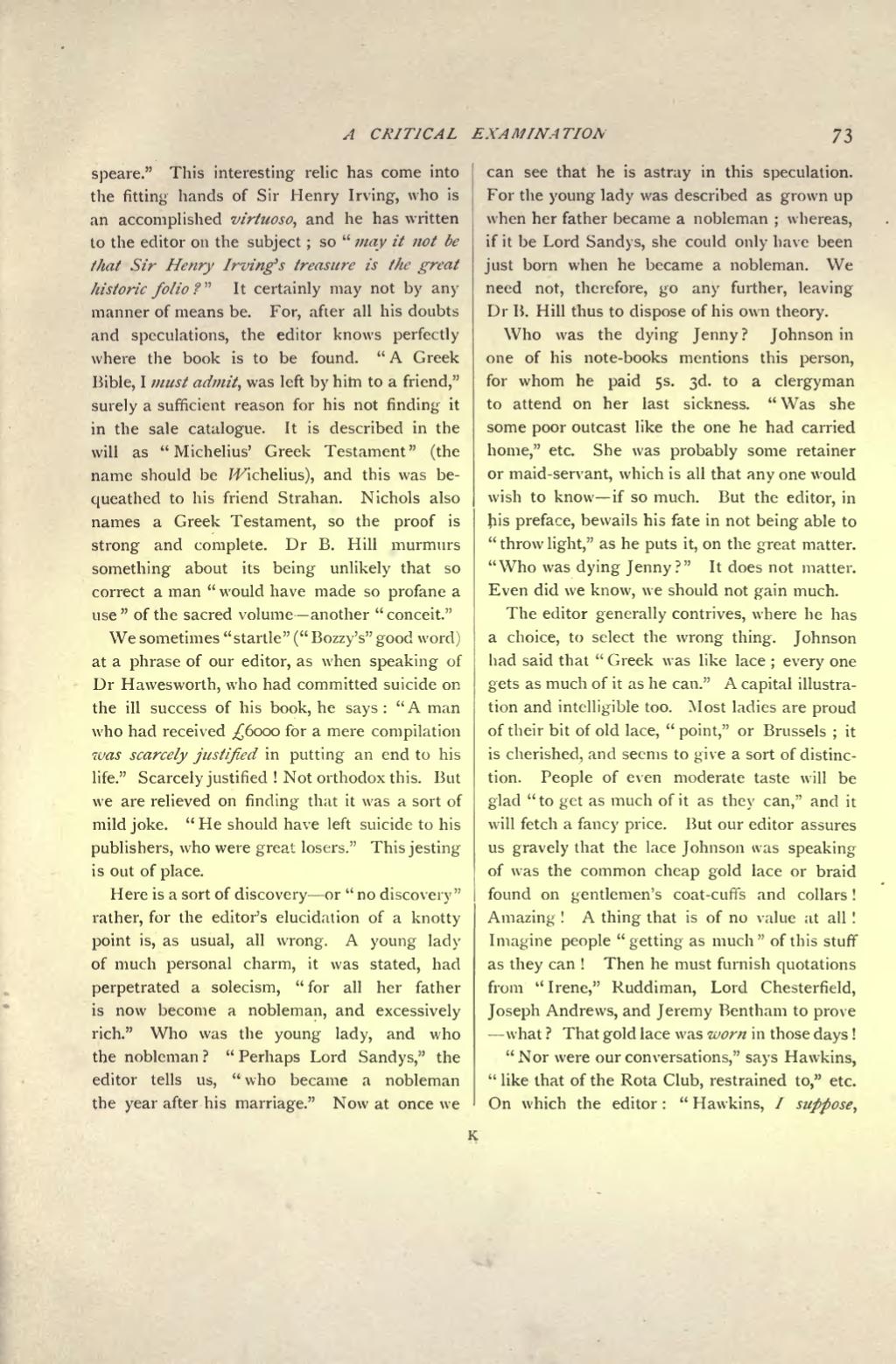speare." This interesting relic has come into the fitting hands of Sir Henry Irving, who is an accomplished virtuoso, and he has written to the editor on the subject; so "may it not be that Sir Henry Irving s treasure is the great historic folio?" It certainly may not by any manner of means be. For, after all his doubts and speculations, the editor knows perfectly where the book is to be found. "A Greek Bible, I must admit, was left by him to a friend," surely a sufficient reason for his not finding it in the sale catalogue. It is described in the will as "Michelius' Greek Testament" (the name should be Wichelius), and this was bequeathed to his friend Strahan. Nichols also names a Greek Testament, so the proof is strong and complete. Dr B. Hill murmurs something about its being unlikely that so correct a man "would have made so profane a use" of the sacred volume—another "conceit."
We sometimes "startle" ("Bozzy's" good word) at a phrase of our editor, as when speaking of Dr Hawesworth, who had committed suicide on the ill success of his book, he says: " A man who had received £6000 for a mere compilation was scarcely justified in putting an end to his life." Scarcely justified! Not orthodox this. But we are relieved on finding that it was a sort of mild joke. "He should have left suicide to his publishers, who were great losers." This jesting is out of place.
Here is a sort of discovery—or "no discovery" rather, for the editor's elucidation of a knotty point is, as usual, all wrong. A young lady of much personal charm, it was stated, had perpetrated a solecism, "for all her father is now become a nobleman, and excessively rich." Who was the young lady, and who the nobleman? "Perhaps Lord Sandys," the editor tells us, "who became a nobleman the year after his marriage." Now at once we can see that he is astray in this speculation. For the young lady was described as grown up when her father became a nobleman; whereas, if it be Lord Sandys, she could only have been just born when he became a nobleman. We need not, therefore, go any further, leaving Dr B. Hill thus to dispose of his own theory.
Who was the dying Jenny? Johnson in one of his note-books mentions this person, for whom he paid 5s. 3d. to a clergyman to attend on her last sickness. "Was she some poor outcast like the one he had carried home," etc. She was probably some retainer or maid-servant, which is all that any one would wish to know if so much. But the editor, in his preface, bewails his fate in not being able to "throw light," as he puts it, on the great matter. "Who was dying Jenny?" It does not matter. Even did we know, we should not gain much.
The editor generally contrives, where he has a choice, to select the wrong thing. Johnson had said that "Greek was like lace; every one gets as much of it as he can." A capital illustration and intelligible too. Most ladies are proud of their bit of old lace, "point," or Brussels; it is cherished, and seems to give a sort of distinction. People of even moderate taste will be glad "to get as much of it as they can," and it will fetch a fancy price. But our editor assures us gravely that the lace Johnson was speaking of was the common cheap gold lace or braid found on gentlemen's coat-cuffs and collars! Amazing! A thing that is of no value at all! Imagine people "getting as much" of this stuff as they can! Then he must furnish quotations from "Irene," Ruddiman, Lord Chesterfield, Joseph Andrews, and Jeremy Bentham to prove—what? That gold lace was worn in those days!
"Nor were our conversations," says Hawkins, "like that of the Rota Club, restrained to," etc. On which the editor: " Hawkins, I suppose,
